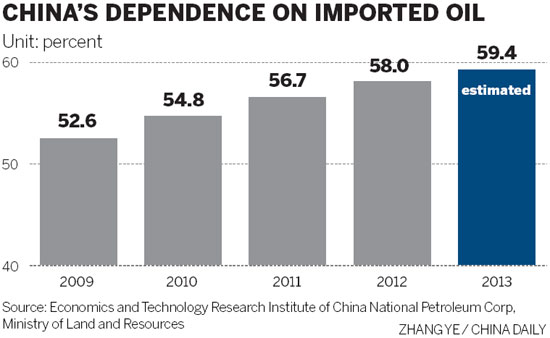
 |
The dependence is expected to reach 59.4 percent in 2013, according to a recent report released by the Economics and Technology Research Institute of China National Petroleum Corp.
China's net oil imports are estimated to be 305 million metric tons in 2013, up 7.5 percent compared with the previous year, the report said.
In comparison, the US reliance on foreign energy imports has declined considerably, and many are predicting that the US could be energy self-sufficient by 2030 thanks to its surging domestic production of shale gas and oil.
The remarkable shift between the two largest energy consumers will profoundly change the international energy trade landscape and affect China's foreign policies, said Lin Boqiang, director of the China Center for Energy Economic Research at Xiamen University.
"Shipping oil from overseas couldn't ensure energy security. China needs to make more efforts to reduce its reliance on imported oil and increase domestic oil production in western areas," Lin said.
In addition, the country needs to diversify destinations and import more from neighboring countries such as Russia to lower the risks during shipping, Lin said.
Wen Guifang, an economist at the Institute of Finance and Trade Economics of the Chinese Academy of Social Sciences, said China should import more when international oil prices slide, and continue to invest in oil-rich countries.
Thanks to the quick development of US shale gas in recent years, its oil imports are declining. China also has abundant shale reserves and could also explore the potential of developing shale gas, Wen said.

















 Missing baby killed in Changchun | Photos: Local residents mourn for killed baby
Missing baby killed in Changchun | Photos: Local residents mourn for killed baby


![]()
